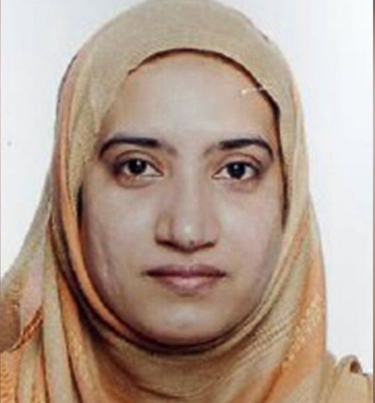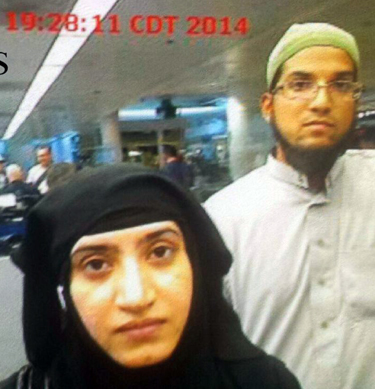(Updated December 10, 2015)
By Mark Ellis

She made a pledge of allegiance to the leader of ISIS immediately before the rampage that killed 14 people and wounded 21 on December 2nd, the mysterious young woman whose ideology overpowered her maternal instincts.
Tashfeen Malik was born in Pakistan to an affluent, politically-connected family and moved to Saudi Arabia when she was about four years old.
When she was older, she returned to southern Punjab province in Pakistan to study pharmacology. One of her professors, Nisar Hussain told the L.A. Times she was hardworking, obedient, and came to school veiled. At one point in college she was first in her class.
“She was religious, but a very normal person as well,” Hussain told the L.A. Times.
A family member in Pakistan who requested anonymity said she changed during college. “After a couple of years of college, she started becoming religious. She started taking part in religious activities, and also started asking women in the family and the locality to become good Muslims,” the family member told the Times.
“She started to talk to somebody in Arabic at night on the Internet. None of our family members in Pakistan know Arabic, so we do not know what she used to discuss.”
Two classmates of Malik said that while she was enrolled in college, she also studied daily at Al Huda Institute, a religious school that promotes a more extreme, fundamentalist form of Islam. The founder of Al Huda, Farhat Hashmi, now lives in Canada. Hasmi is currently promoting the imposition of sharia law in Canada.
Pervez Hoodbhoy, a nuclear scientist and critic of extremist Islam, has written about the spread of religious conservatism in Pakistan. He believes Hashmi is one of its driving forces. “Through ceaseless proselytizing and subtle pressure tactics, Al-Huda has brought a majority of my university’s students under the burqa,” he told the Daily Mail.
In addition to schools in Pakistan, India, the U.K. and UAE, Al Huda operates a school for women in Hawthorne, California.
Malik first connected with Syed Farook, an American of Pakistani origin, on a dating website, a lawyer for Farook’s family told reporters, although the lawyer’s account has been challenged. The couple met during Farook’s pilgrimage to Mecca, Saudi Arabia in the fall of 2013, authorities told ABC.

After a second trip in July 2014, Farook and Malik returned to the U.S. as an engaged couple. They were married the following month.
Malik entered the U.S. on a “fiancé” visa, which allows an American fiancé to petition for his or her partner’s temporary entry prior to marriage. For the visa application, the address she listed in her Pakistani hometown, ABC learned, does not exist. Malik received her Green Card this summer, U.S. officials said.
The fiancé visa appears to be a loophole in the legal immigration system exploited by the terror couple in this instance.
A family member in Pakistan told the L.A. Times that Malik began posting extremist messages on Facebook after she arrived in the U.S.
Neither Malik or Farook were on the FBI’s radar in the U.S., but Farook had contact with individuals who were being investigated.
The growing conviction of many observers is that Malik was radicalized first. But the unifying tie in their courtship and marriage appears to be their radical jihadist leanings.
Lawyers for the Farook family tried to minimize the significance of Malik’s Facebook ISIS pledge and said there had not been much real evidence the couple has “extremist tendencies.”
“None of the family knew of him as being extreme, aggressive or having any extreme religious views,” one of the attorneys maintained. The attorney’s assertions have been discredited by more recent discoveries by the FBI.
Nada Bakos, a former CIA analyst, told ABC News she would not be surprised by Malik’s ISIS connection. “Terrorism is not gender-specific,” she said.
“Men don’t have a monopoly on terrorism or conducting violent acts,” she told ABC. “At this point, in the evolution of terrorism, it wouldn’t be surprising to see a woman take an operational role.”



